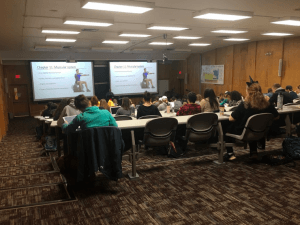Hard Class? Think you won’t Pass?
Nov 8, 2018 | News |

By Grace McIntosh Contributing Writer

Professor Timothy Breton teaching BIO 150, a class of 80 students. (Photo by Grace McIntosh
As the semester quickly rolls by, some students may feel like they are struggling to keep up. Whether it is a seemingly impossible class, difficult professor, or lack of motivation, failing a course can be avoided. Professors and high-achieving students give their best advice on how to escape common mistakes and study efficiently to those who feel overwhelmed with the thought of not passing a class.
Professor of Biology Timothy Breton said that the biggest mistake he sees when students study for exams is lack of active involvement. “Studying for several hours late at night and just glossing over the material is often not as effective as less time spent that involves quizzing yourself or pushing each other to succeed in an active study group,” said Breton. According to Breton, focusing on learning the material, versus how much time is spent on studying, increases the chance of successful outcomes.
Alyssa Morin, a sophomore who is currently in Professor Breton’s class, said that it is critical to dedicate enough time to make sure the content of a course is understood. Morin also emphasizes the importance of finding the right place to study. “Find a quiet place with no one around,” said Morin. “I always find myself in the library or my dorm room.”
Morin’s phone can also be a distraction to her, so she uses an app to lock it for a certain period of time. “It does not allow me to access anything and I just bust out the work that needs to be done,” she said.
Abigayle Weston, also a sophomore at UMF, stays motivated by thinking about her career goals. Weston’s advice to those falling behind is to make one giant list of everything that needs to get done and color-code it by priority. “My favorite way to study is by rewriting my notes,” Weston said. Rewriting notes allows for the content to be refreshed into Weston’s mind and helps her retain information.
Morin encourages students who aren’t able to figure out course material to seek out help from professors. “Go to your professor’s office hours and make sure to set up tutor sessions in the learning commons,” Morin said.
Morin also stated that a key factor to success is putting school before anything else. However, she also points out the importance of taking breaks and making time for leisure activities.
Professor of Mathematics, Michael Molinsky, said that procrastination can be a sure way to do poorly. “By waiting until the very last possible minute to do homework or study for exams, students put themselves in a position where they cannot ask any questions about the parts the material that they don’t understand,” said Molinsky. Another problem that Molinsky sees often is students will memorize methods but not how to utilize them.
For students who feel that a class is just absolutely impossible, Professor Breton said, “Be strategic, break things down, and spend the most time on very important topics you know will appear on an exam.” Allocating time to focus on material that needs to be understood as well as asking questions outside and inside class can be the difference of passing or failing a course according to Breton.
“While trying obviously doesn’t guarantee success, you can certainly guarantee failure by not even trying from the start of the class,” said Molinsky. As a general rule of thumb for college, “Students should be spending an average of two hours outside of class each week for each credit,” Molinsky said. Students should be dedicating an average of eight hours a week for a four credit course. The weekend can be an effective slot of time to catch up on school work as well.
Whether it is dedicating more time to studying, working harder in classes, or being more actively involved, utilizing this advice may make a difference in academic performance.
